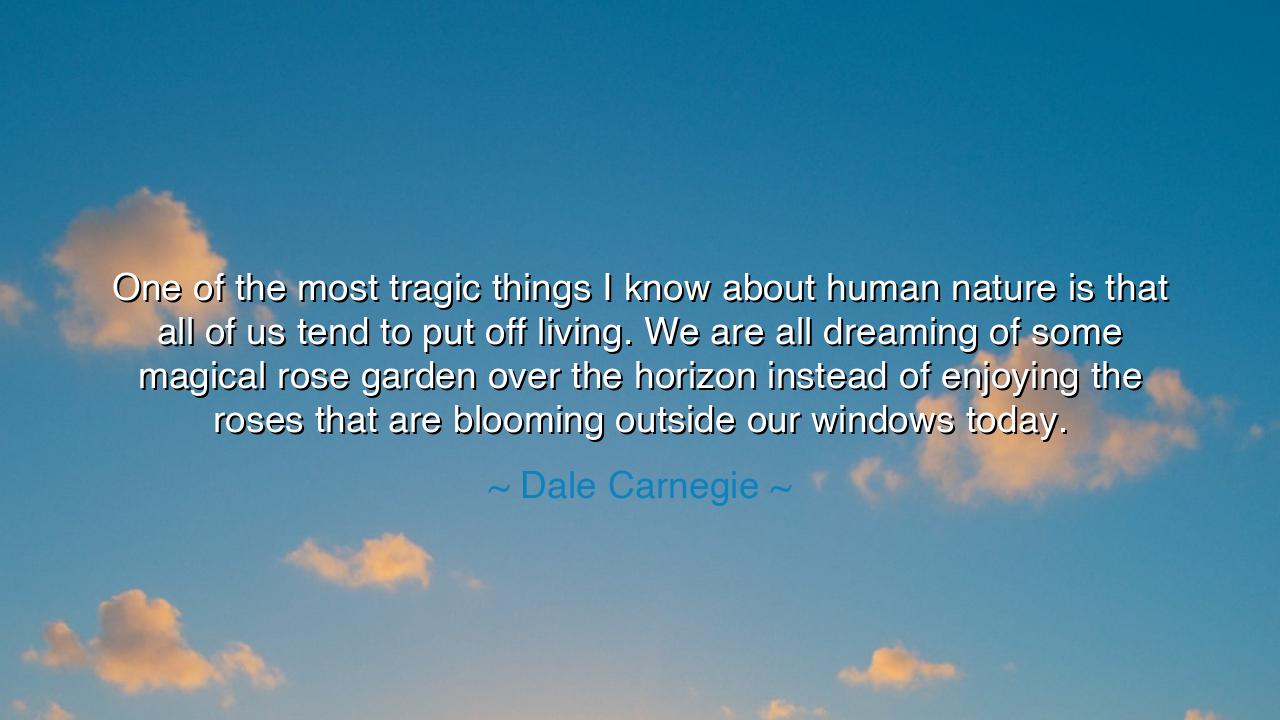
One of the most tragic things I know about human nature is that
One of the most tragic things I know about human nature is that all of us tend to put off living. We are all dreaming of some magical rose garden over the horizon instead of enjoying the roses that are blooming outside our windows today.






"One of the most tragic things I know about human nature is that all of us tend to put off living. We are all dreaming of some magical rose garden over the horizon instead of enjoying the roses that are blooming outside our windows today." Thus wrote Dale Carnegie, the master teacher of self-mastery and communication, whose wisdom has endured across generations. His words strike at the very heart of our restless condition: that men and women, forever yearning for tomorrow, often forget to embrace the beauty of today.
The ancients knew this folly well. They told of kings who hoarded wealth for a future feast, only to perish before tasting the food. They warned of men who gazed so far across the horizon that they stumbled over the stones at their feet. In Carnegie’s image of the rose garden, we see this timeless truth: that we long for a perfection always out of reach, a future blooming field that may never come, while ignoring the roses already blooming at hand. What is this but blindness to the gift of the present?
Consider the story of Leo Tolstoy, the great Russian novelist, who in his later years wrote of a man named Pahom in How Much Land Does a Man Need? Pahom dreamed always of more land, greater wealth, and endless opportunity just beyond his grasp. At last, he is given the chance to claim as much land as he can walk around in a single day—but in his greed, he overextends himself, collapses, and dies. His grave becomes the only land he truly possesses. This tale reflects the very tragedy Carnegie describes: the endless chasing of the horizon while life’s roses wither unseen at our windows.
And yet, this tragedy is not inevitable. For within Carnegie’s lament is also a call to awaken. The roses at our windows are not lesser blessings; they are the very treasures we were meant to cherish. The laughter of children, the warmth of a meal, the sunlight of a morning, the friendship of those who walk beside us—these are the gardens of today. To forsake them for dreams of tomorrow is to exchange life itself for shadows. The wise heart learns to see, to touch, to smell the roses that bloom now, for tomorrow is never promised.
Still, Carnegie does not condemn the dream. To look toward the horizon, to aspire, is not wrong. But to live only in the horizon, neglecting the ground beneath one’s feet, is to live in illusion. The path of wisdom is balance: to dream of the rose garden to come, but to rejoice in the blossoms that are already here. This balance is the secret of joy, the shield against regret, the mark of one who has truly lived.
The lesson is clear: do not put off living. Do not say, “When I have wealth, I will rejoice,” or, “When I am older, I will rest,” or, “When life is easier, I will be grateful.” For life is not waiting in the distance—it is already here, flowing through your veins and blooming outside your window. The tragic thing is not that roses are scarce, but that we fail to notice them.
Practically, this means pausing each day to look, to listen, to be present. Step away from endless striving long enough to savor what is near. Make time to eat slowly with loved ones, to walk beneath the open sky, to speak gratitude for what already is. Yes, plan for tomorrow—but live in today. For as Carnegie reminds us, the roses of the future are uncertain, but the roses of the present are real, fragrant, and fleeting.
So pass this wisdom on: “Enjoy the roses at your window before dreaming of gardens over the horizon.” Teach your children, your companions, and your own soul that the secret of happiness is not far away, but close, blooming quietly each day. And when asked what the greatest tragedy of man is, answer with Carnegie’s voice: “That he waits to live, when life is already in his hands.”






AAdministratorAdministrator
Welcome, honored guests. Please leave a comment, we will respond soon